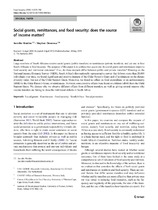| dc.contributor.author | Waidler, Jennifer | |
| dc.contributor.author | Devereux, Stephen | |
| dc.date.accessioned | 2020-02-12T13:13:50Z | |
| dc.date.available | 2020-02-12T13:13:50Z | |
| dc.date.issued | 2019 | |
| dc.identifier.citation | Waidler, J., & Devereux, S. (2019). Social grants, remittances, and food security: Does the source of income matter? Food Security, 11(3), 679-702. doi:10.1007/s12571-019-00918-x | en_US |
| dc.identifier.issn | 18764517 | |
| dc.identifier.uri | http://hdl.handle.net/10566/5176 | |
| dc.description.abstract | Large numbers of South Africans receive social grants (public transfers) or remittances (private transfers), and yet one in four
South Africans is food insecure. The purpose of this paper is to address two questions: do social grants and remittances improve
food security and nutritional outcomes? If so, do these impacts differ between public and private transfers? Drawing on the
National Income Dynamic Survey (NIDS), South Africa’s first nationally representative survey that follows more than 28,000
individuals over time, we found significant and positive impacts of the Older Person’s Grant and of remittances on the dietary
diversity index, but not of the Child Support Grant. Moreover, we found no effect on food expenditure or on anthropometry
(BMI) by the Older Person’s Grant, or remittances. However, some positive effects were found on children’s BMI from the Child
Support Grant. We discuss why we observe different effects from different transfers, as well as giving several reasons why
income transfers are failing to close the nutritional deficits in South Africa. | en_US |
| dc.language.iso | en | en_US |
| dc.publisher | Food Security | en_US |
| dc.subject | Social grants | en_US |
| dc.subject | Remittances | en_US |
| dc.subject | Food security | en_US |
| dc.subject | South Africa | en_US |
| dc.subject | Social protection | en_US |
| dc.title | Social grants, remittances, and food security: does the source of income matter? | en_US |
| dc.type | Article | en_US |

